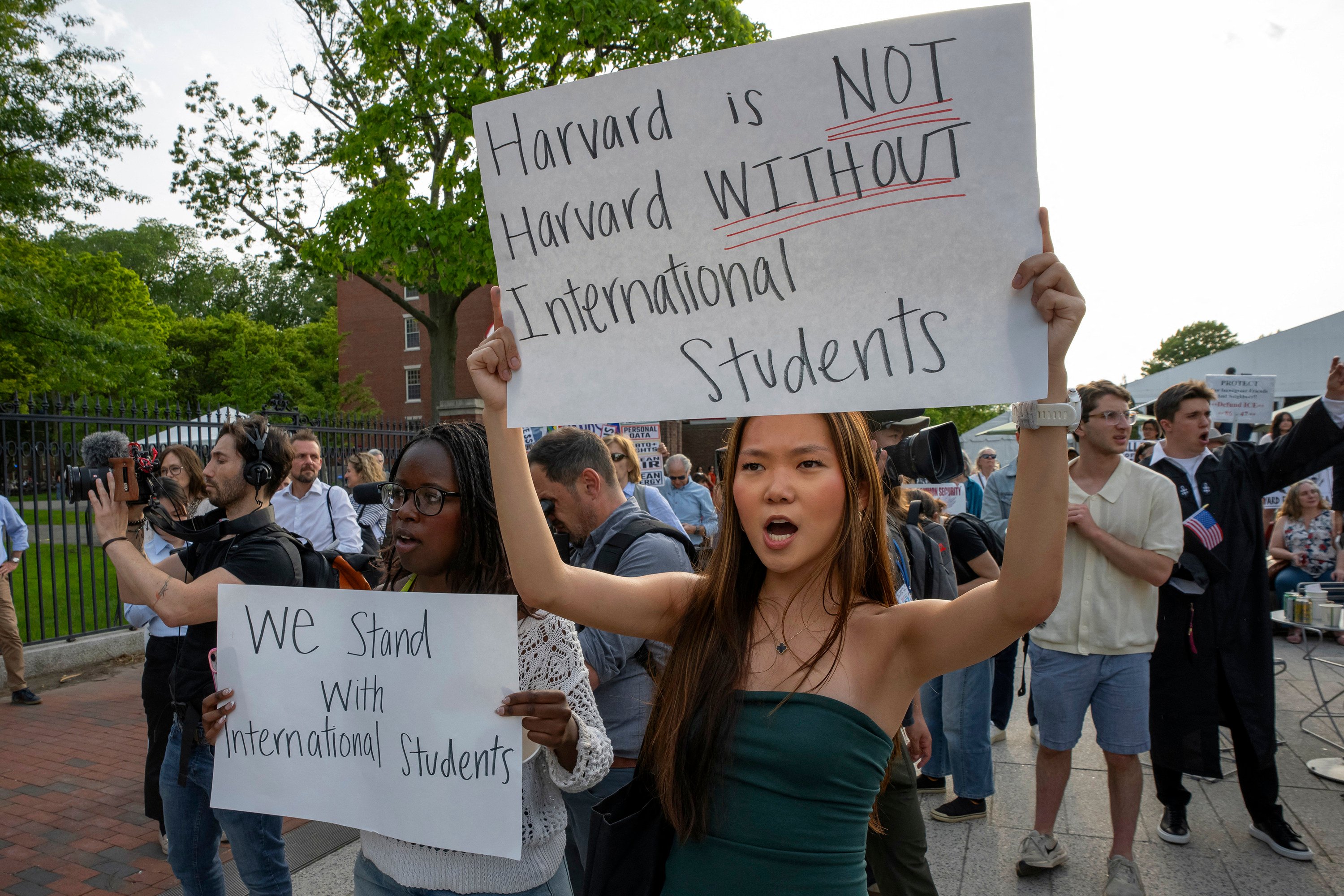Trump’s war on Harvard shows no sign of stopping
The US administration’s attacks on higher education are having a chilling effect across academia and eroding American prestige

In January 2017, just a week after taking office, US President Donald Trump signed the now-infamous travel ban, barring citizens from seven predominantly Muslim countries from entering the United States. Harvard’s then-president, Drew Faust, issued a sharply worded open letter almost immediately, reaffirming the importance of international students and scholars to the university’s “identity and excellence”. Trump didn’t respond publicly, but it is well known that he holds grudges.
By September that same year, then-attorney general Jeff Sessions announced the end of the Deferred Action for Childhood Arrivals, a policy from the Obama administration for young undocumented immigrants who came to the US as children. Harvard responded the same day, with Faust writing that “this cruel policy recognises neither justice nor mercy”. The university offered undocumented students legal counsel and advisory support.
In July 2020, as Covid-19 raged, the Immigration and Customs Enforcement agency declared that if classes were held online in the autumn, international students would have to leave the US or transfer to a school with in-person instruction. Harvard and the Massachusetts Institute of Technology filed a joint lawsuit.
In court, Harvard made the case before US District Judge Allison Burroughs, appointed during the Obama administration, that many of its international students could not return home because of global travel restrictions. Only a week after issuing the guidance, the government withdrew the rule.
Fast forward to May 22 this year. The second Trump administration’s Department of Homeland Security announced the cancellation of Harvard’s eligibility to enrol international students, citing “fostering violence, antisemitism, and coordinating with the Chinese Communist Party on its campus”. The world was stunned.
In the narrative of elite American universities, international students symbolise the “global academic community”. Nearly 7,000 international students – more than 27 per cent of Harvard’s student body – come from outside the US. They contribute hundreds of millions of dollars in tuition fees annually and elevate Harvard’s academic standing. Many remain in the US to become vital pillars in various fields.
But in Trump’s narrative, those same numbers are reframed. “Part of the problem with Harvard is they’re about 31 per cent foreigners coming to Harvard,” he complained recently. “We give them billions of dollars, which is ridiculous.” He went on, “We want a list of those foreign students and we’ll find out whether or not they’re OK.”
Trump’s tactics against universities are nothing new – freezing federal funds, threatening to revoke tax-exempt status, pressuring administrations to cooperate with investigations. Columbia was the first to yield. In March, it agreed to review the content of Middle East programmes, which includes its Centre for Palestinian Studies.
With its US$53.2 billion endowment, Harvard is uniquely equipped to resist. Its alumni network spans global political and business elites, including some in Trump’s own cabinet.
When Harvard’s turn came, the demands escalated – from control over the curriculum to hiring processes, day-to-day operations and, most outrageously, handing over the names and private data of all international students. Faced with an existential threat, Harvard sued. The same Judge Burroughs swiftly blocked the new directive and extended the injunction indefinitely during a May 29 hearing. Harvard scored a narrow judicial win, yet again.
But the real war is just beginning. Yes, Harvard has its issues, including accusations of elitism and an inadequate response to antisemitism on campus. But what is most troubling is not the lawsuit itself but the chilling effect this war is having across American academia.
One Chinese postdoctoral student at Harvard told me that self-censorship has already begun. “Trump doesn’t like minority, race or gender studies. We have to avoid those terms when submitting proposals. Many of us came here for the freedom to pursue what we care about, backed by real funding. That freedom is gone now.”
The very foundation of American academic prestige – its mutual embrace of global talent – is crumbling. Applicants fear invalidated visas, revoked funding or even arbitrary deportation and detention.
In the US, once-neutral values such as diversity, equity, inclusion and global perspective have become political issues. From halting affirmative action to cracking down on pro-Gaza campus protests and questioning US-China academic ties, accusations of being “anti-American” have become a convenient weapon. The conflict has moved beyond policy debates to a fight over who gets to define “America”.
Populism thrives on “us vs them” narratives. It doesn’t need brute force, just fear. A hostile mood now spreads unchecked as elite universities are deemed anti-American. Instead of symbolising the dignity of academic freedom, Harvard’s defiance of Trump has become a target of resentment.
On May 28, things ramped up further. The Trump administration suspended all global student visa interviews and expanded screenings of international students’ social media. On May 29, Secretary of State Marco Rubio announced plans to begin revoking existing Chinese student visas.
While Trump supporters cheer the news on social media, the 2018 book How Democracies Die by Harvard government professors Steven Levitsky and Daniel Ziblatt is receiving renewed attention.
After the latest unhinged news, I settled in to watch an episode of the Netflix dark comedy The Residence. In one scene, two senators huddle together during a congressional recess: “You want to abolish housing or labour or education?”, says one. “We’ll get that done. And I don’t just mean the departments. I mean, like, education as a concept. Done. Gone.”